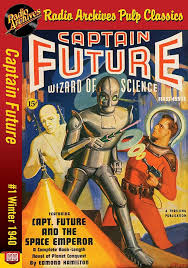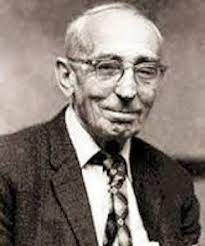Japanese anime (1978-9) 52 half-hour TV episodes rated 7.9 by 1,700 cineastes. These were also screened throughout Europe at the time, as witnessed by the German and Spanish reviews on the IMDb.
Genre: SyFy.
DNA: Japan.
Verdict: More, please.
Tagline: Holy Jupiter!

Between 1940 and 1951 Captain Future policed the nine planets in radio plays, pulp magazines, and even pulpier paperback books in the United States. There were further adaptations, like the Japanese series noted above.
Seventeen of his 45-minute adventures were available from Radio Archives the last time I looked. Recommended to all SyFy nerdlngs. These radio plays were written by Edmond Hamilton and voiced by Milton Bagby who does a marvellous job.
Captain Future is Curtis Newton who is the most scientific of all scientists in the Solar System, where all nine planets, some moons, and a few asteroids and a comet or two are inhabited, and even some pinheads, mostly by humanoids, along with the required monsters for Curtis to tame, bamboozle, trap, or slay.
In his mission of mayhem he is aided by a living brain in a self-propelled glass box with waldos, being the last of Dr Simon Wright whose science is second only to that of Curtis; Grag the giant metal manling; Otho the rubber android, and assorted others. See the Wikipedia entry for details.
Nothing stops Captain Future: when villains maroon him on an uninhabited asteroid in a space suit with two hours of air, using the metals of the asteroid and his handy sonic screwdriver borrowed from Dr Who, he promptly builds a nuclear reactor to turn the rock itself into a space ship. Likewise the dreaded demons who dwell in the Great Red Fire Sea on Jupiter are no match for this wizard of science.
Sorting out the Solar System is a big job, to be sure, but Curt is an even bigger sort-outer than that, and in the later stories he extends his crusade against wrongdoers to time travel as well as interstellar and intermolecular space. This crusader needs no cape when he has science on his side.

I heard some of these stories as a child, syndicated to a local radio station, and now I listen to them on my daily walks as a holiday from the unrelieved idiocy of contemporary events.




